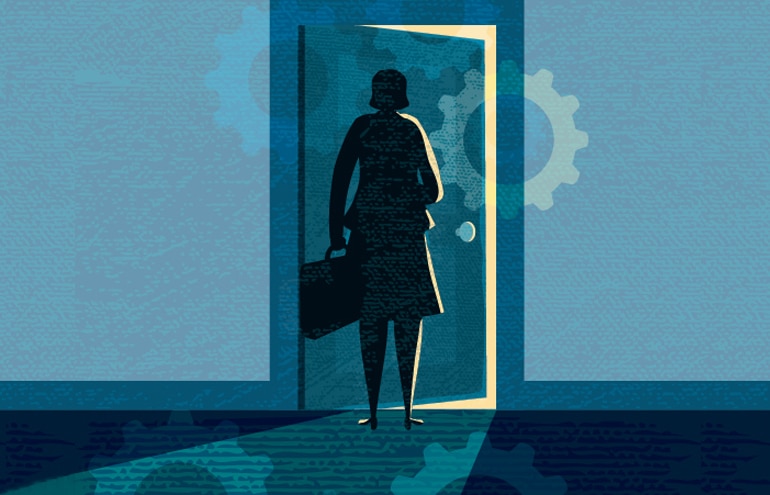What is it about practicing law that invites lawyer loneliness more than other professions? LCL’s Shawn Healy explores the reasons and the cure.

Table of Contents:
Clearly, there is awareness of lawyer stress as well as attention focused on resources to address the problems lawyers face during their careers.
One issue at the core of so many negative mental health outcomes is loneliness. As reported recently in Harvard Business Review, a survey of 1,624 full-time employees found that those working in the legal field were the loneliest of all professionals.
And it is this experience of feeling alone that drives addiction, depression, stress, burnout and relationship turmoil.
Being Alone versus Feeling Lonely
An important distinction needs to be made to understand and combat loneliness. The experience of loneliness is a feeling of isolation. Solitude, on the other hand, is the state of being alone, but not feeling lonely. Therefore, people can experience the phenomenon of “feeling alone in a crowd.” You might be surrounded by others but still feel as though no one understands what you are going through. Likewise, you might be working alone much of the time but not feel a sense of loneliness.
Personality plays a role in how comfortable people are with solitude. Introverts often require more solitude as a time of “recharging,” while extroverts might minimize their solitary time as they recharge through social interaction. Loneliness is not about whether you are in close physical proximity to others. Instead, it is about whether you feel connected to and supported by others.
Lawyer Loneliness
At the heart of loneliness is a lack of connection. Real human connection allows us to relate to others, feel supported and validated by others, and share our struggles and victories with those who matter most to us. Without this authentic connection, we feel distance from others, a lack of trust and a growing sense that we are alone (that we are not understood, that we must carry our burdens by ourselves).
So, what is it about practicing law that invites loneliness more than other professions? While I am sure there are many additional factors, below are common sources of loneliness I regularly see in lawyers.
The All-Important Reputation
A misconception exists that perfection leads to a good reputation. The truth is that a good reputation is built on resilience, honesty, reliability and hard work. Projecting an invulnerable veneer (portraying to clients and colleagues that you have it all worked out and you possess no weaknesses) may seem like a useful strategy to win clients and impress others, but it is a very harmful tactic when it comes to your mental and emotional well-being. Whenever we pretend to be something that we know ourselves not to be, we automatically separate ourselves from others. The only way to establish real human connection is to know and be known by someone else, including our vulnerabilities, failures, strengths and dreams.
The Weight of the Work
A common issue among lawyers serving at-risk and traumatized populations is the tendency to hold onto the emotional material they hear. Clients’ stories start to weigh them down. This “vicarious trauma” can lead some, often motivated by a concern about burdening others, to keep their struggles to themselves, thereby creating even more distance between them and their sources of support. Unlike mental health professionals, lawyers in general are not trained on how to practice self-care, even though clients often treat lawyers like therapists.
The work can also be weighty for other reasons. You may be a solo practitioner feeling the pressure to do it all, a new lawyer who feels constantly unqualified, a government lawyer who feels like there is never an end to the work, or a big firm associate feeling pressure to overperform so you can keep up with the other high-achieving associates.
The Cure for Lawyer Loneliness
Simply put, we all must create and maintain trusting relationships with other people — both at work and in our personal lives.
Solo practitioners can connect with other solos by sharing office space, joining groups for solo practitioners, sharing cases, and having or serving as mentors.
Big firm associates can get to know their colleagues and identify allies with whom they can discuss frustrations and struggles.
Every lawyer can benefit from law-related resources — colleagues, bar association groups, lawyer assistance programs, for example — and by practicing self-care, creating and maintaining boundaries, and keeping work in perspective. (There’s more to life than what you do for a paycheck.) After all, your colleagues and peers are probably the ones who will understand your work experiences more than anyone else.
In addition, every lawyer needs support in their “real lives” outside of work. Friends and loved ones are essential to well-being. Even though they might not completely understand the work you do or the burden you carry, having a caring outside perspective on your stress is extremely helpful. Not to mention that friends and loved ones probably like to do non-work-related activities with you, which are essential for your overall well-being and connection with others.
So, don’t go it alone. Loneliness abounds when you do.
You might also like:
- What to Do When Everything Feels Bad
- Five Steps to Confront Burnout and Depression
- Depression: A Lawyer Pandemic
Image © iStockPhoto.com.

Don’t miss out on our daily practice management tips. Subscribe to Attorney at Work’s free newsletter here >





















